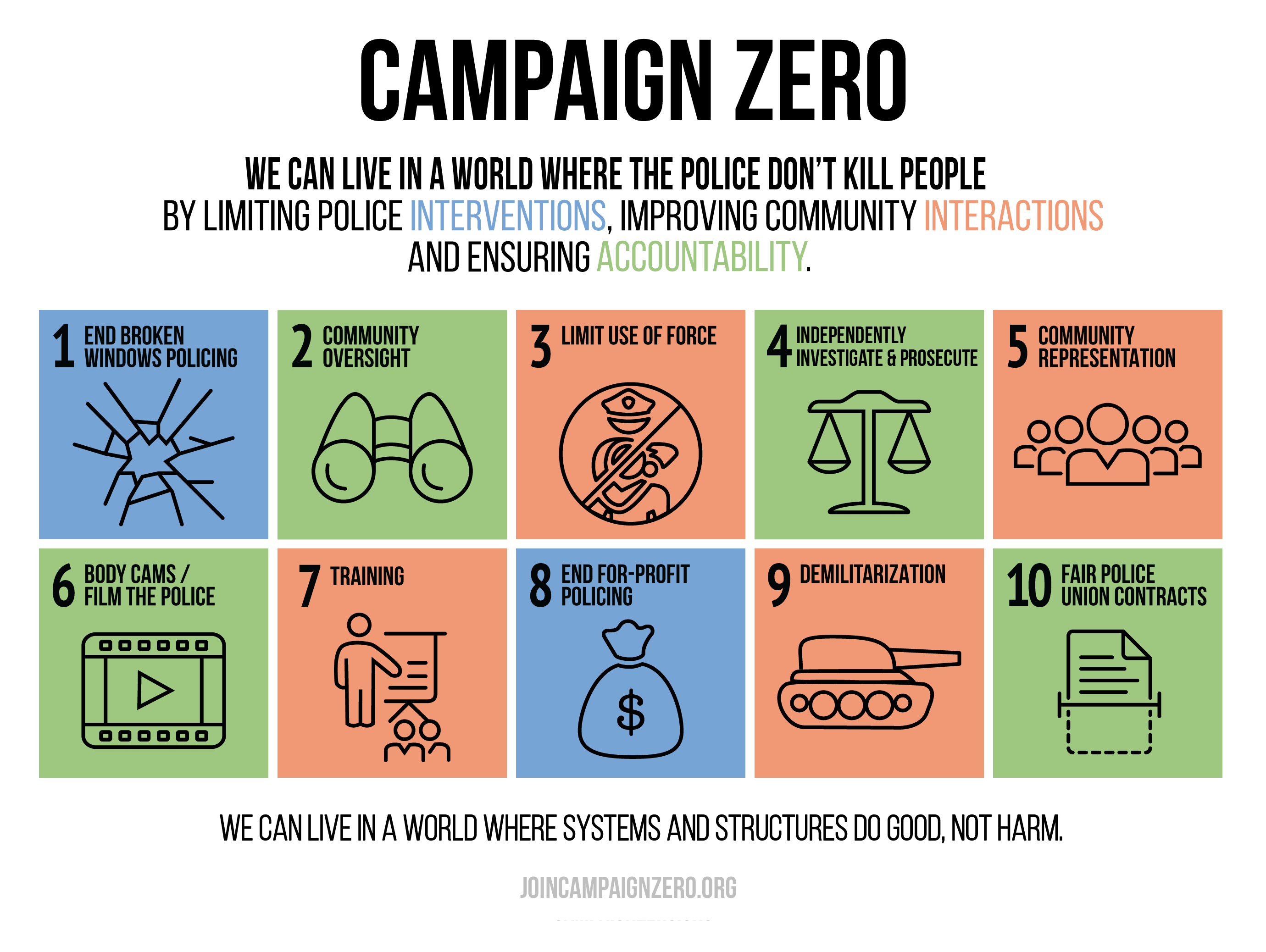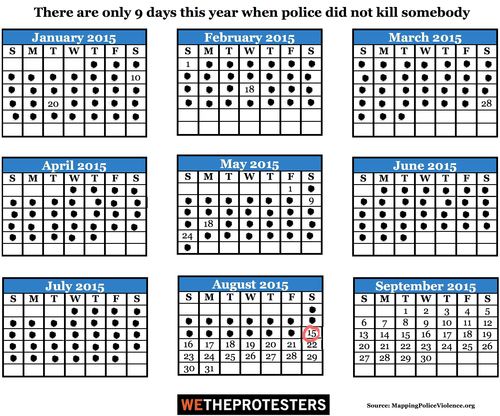The Black Lives Matter Activists Have a Plan: Campaign Zero

By:
To end police violence, the public must take steps to advance comprehensive policy reform and ensure that the structural problems of policing are not only addressed—but solved. That is the goal of Campaign Zero, a dynamic platform that was introduced by four leading Black Lives Matter activists—Samuel Sinyangwe, Brittany Packnett, DeRay McKesson, and Johnetta Elzie, who goes by Netta—last week.
 Campaign Zero - squarespace.com
Campaign Zero - squarespace.com
In the year that has passed since Michael Brown's death, which spurred widespread protests and led to the Black Lives Matter movement, significant progress has happened in the push to raise public awareness of racial injustice, particularly as it applies to policing in the U.S., and Campaign Zero aims to act on that progress—to hone the momentum of the movement and direct it toward 10 actionable policy reform measures.
To effectively combat police violence, activists are aiming to give a clear and understanding of the extent to which law enforcement practices have affected the lives of people living in this country. An interactive map created by Sinyangwe does just that—identifying the date and location of every reported police killing between January 2013 and July 2015—and supplemental graphs show exactly how racially disproportionate these police-involved incidents are. Black people are three times more likely to be killed by police than white people, Campaign Zero notes; and 33 percent of Black victims were unarmed, compared to 18 percent of white victims.
"There have only been nine days this year when the police have not killed somebody," the campaign organizers wrote. "Last month alone, the police killed 125 people. This must stop. We must end police violence so we can live and feel safe in this country."
 Campaign Zero - joincampaignzero.org
Campaign Zero - joincampaignzero.org
Part of the problem is geographically relevant. That is, "where you lives matter." As the advocacy group explains, Black people are six times more likely to be killed by police in Oklahoma than Georgia, raising serious questions about the influence of training on police activity. What's more, fewer than one-third of those killed by police were armed or even suspected of a violent crime.
These problematic policing statistics show there is room for reform. That much has been established, even if the statistics still manage to surprise and offend us.
Critics of the Black Lives Matter movement have called on the group to bring forth solutions, and over the last year, those proposals have been in the works. In response to those criticisms, and in order to create a comprehensive plan, Campaign Zero drafted a measure that responded to community concerns—they took into consideration data collected from a variety of federal, state, and community-level sources, including reports from the President's Task Force on 21st Century Policing.
It's a multi-part plan, and the campaign's website provides an in-depth look at the proposals and the rationale behind each measure, respectively. From broader policy reform concepts (e.g. end Broken Windows policing) to specific, community-oriented recommendations, Campaign Zero makes it clear that achieving structural change demands both short-term and long-term thinking. It is not enough to simply call for sweeping reform, advocates must offer up an agenda that lawmakers can adopt and push forward on a state and federal level.
Here's a look at the plan.
1. End Broken Windows policing.
In order to reduce the country's staggering incarceration rate, putting an end to "Broken Windows" policy is a necessity. Not only are practices such as "Stop-and-Frisk" unpopular among residents of communities where overpolicing has become endemic—but it also lends to racial profiling.
2. End policing for profit.
"Police should be working to keep people safe, not contributing to a system that profits from stopping, searching, ticketing, arresting and incarcerating people," the group wrote. Setting ticket quotas, for example, can seriously impact the lives of those caught up in this seemingly profit-driven feature of the justice system.
3. Limit use-of-force.
In the vein of recent reports, including that offered by the Police Executive Research Forum, Campaign Zero supports reform measures that emphasize limitation on police use-of-force and revised standards for when it is permissible to use deadly force against a suspect. Putting an end to traffic-related police killings would also be highly advisable.
4. Demilitarization of the police.
Not only has the militarization of the police come under public scrutiny following the 2014 protests in Ferguson, Missouri—where images of law enforcement officials donning riot gear and driving around in armored tanks left a strong impression on the nation—but it has also had a direct impact on the communities where this military-style response has been implemented. "Last year alone, militarized SWAT teams killed at least 38 people," Campaign Zero reported. To combat this trend, the group suggests extending President Obama's cuts to federal programs that provide military equipment to police departments across the country, in addition to establishing local restrictions on the use of this equipment.
5. Mandate body cameras and continue to record police activities.
"While they are not a cure-all, body cameras and cell phone video have illuminated cases of police violence and have shown to be important tools for holding officers accountable," Campaign Zero writes. "Every case where a police has been charged with a crime for killing a civilian this year has relied on video evidence showing the officer's actions."
6. Reform police training.
There is often an avoidable breakdown in communication between police and residents of the communities they serve. One way that can be avoided is through re-training, in conjunction with more continuous efforts to train officers, particularly in deescalation. The standard program that police officers undergo should also include sessions that take into consideration the dangers of unconscious or implicit racial bias.
7. Establish community oversight programs.
According to the Bureau of Justice Statistics, less than one in 12 cases of police misconduct result in any kind of disciplinary action against the responsible officer. In order to restore trust between the public and police, it is crucially important that we impose civilian oversight structures to hold law enforcement officials accountable. That means, citizens should be involved in decisions and investigations into incidents of police misconduct.
8. Diversify the police force nationwide.
"While white men represent less than one third of the U.S. population, they comprise about two-thirds of U.S. police officers," Campaign zero wrote. "The police should reflect and be responsive to the cultural, racial and gender diversity of the communities they are supposed to serve."
To add your own policy proposal to Campaign Zero, make a recommendation here.
